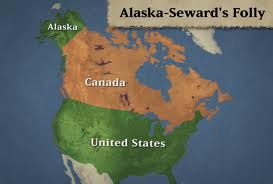AP US History Period 5
4.3(3)
4.3(3)
Card Sorting
1/89
Earn XP
Description and Tags
Study Analytics
Name | Mastery | Learn | Test | Matching | Spaced | Call with Kai |
|---|
No study sessions yet.
90 Terms
1
New cards
Popular Sovereignty
The notion that the sovereign people of a given territory should decide whether to allow slavery.
2
New cards
Fugitive Slave Law
Passed as part of the Compromise of 1850, it set high penalties for anyone who aided escaped slaves and compelled all law enforcement officers to participate in retrieving runaways.
3
New cards
Uncle Tom's Cabin
Harriet Beecher Stowe's widely read novel that dramatized the horrors of slavery.
4
New cards
New York Draft Riots
Uprisings during the Civil War (1863), mostly of working-class Irish-Americans, in protest of the draft. Rioters were particularly incensed by the ability of the rich to hire substitutes or purchase exemptions.
5
New cards
Emancipation Proclamation
1863. Declared all slaves in rebelling states to be free but did not affect slavery in non-rebelling Border States.
6
New cards
Sherman's March to the Sea
1864-1865. Union General William Tecumseh Sherman's destructive march through Georgia. An early instance of "total war", purposely targeting infrastructure and civilian property to diminish morale and undercut the Confederate War effort.
7
New cards
Freedmans' Bureau
1865-1872. Created to aid newly emancipated slaves by providing food, clothing, medical care, education, and legal support.
8
New cards
Black Codes
1865-1866. Laws passed throughout the South to restrict the rights of emancipated blacks.
9
New cards
KKK (Ku Klux Klan)
An extremist, paramilitary, right-wing secret society founded in the mid-nineteenth century and revived during the 1920s. It was anti-foreign, anti-black, anti-Jewish, anti-pacifist, anti-Communist, anti-internationalist, anti-evolutionist, and anti-bootlegger, but pro-Anglo-Saxon and pro-Protestant. Its members, cloaked in sheets to conceal their identities, terrorized freedmen and sympathetic whites throughout the South after the Civil War.
10
New cards
Sharecropping
An agricultural system that emerged after the Civil War in which black and white farmers rented land and residences from a plantation owner in exchange for giving him a certain "share" of each year's crop.
11
New cards
Hayes-Tilden Election
The South conceded to let Hayes win the presidency because he agreed to pull out the troops.
12
New cards
Compromise of 1850
Admitted California as a free state, opened New Mexico and Utah to popular sovereignty, ended the slave trade (but not slavery itself) in Washington D.C., and introduced a more stringent fugitive slave law. Widely opposed in both the North and South, it did little to settle the escalating dispute over slavery.
13
New cards
Kansas-Nebraska Act
1854. Proposed that the issue of slavery be decided by popular sovereignty in the Kansas and Nebraska territories, thus revoking the 1820 Missouri Compromise. Introduced by Stephen Douglass in an effort to bring Nebraska into the Union and pave the way for a northern transcontinental railroad.
14
New cards
Homestead Act
1862. A federal law that gave settlers 160 acres of land for about $30 if they lived on it for five years and improved it by, for instance, building a house on it. The act helped make land accessible to hundreds of thousands of westward-moving settlers.
15
New cards
Gettysburg Address
1863. Abraham Lincoln's oft-quoted speech, delivered at the dedication of the cemetery at Gettysburg battlefield. In the address, Lincoln framed the war as a means to uphold the values of liberty.
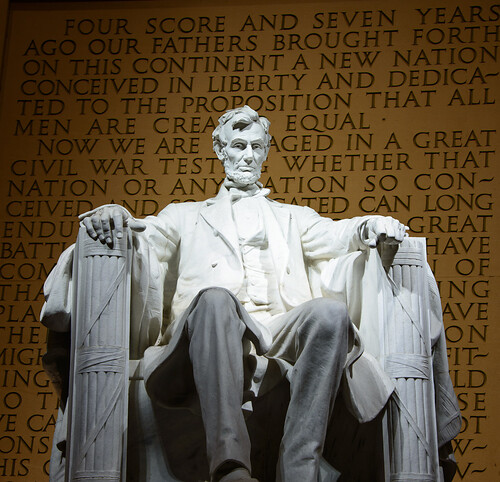
16
New cards
Appomattox Court House
Site (city) where Robert E. Lee surrendered to Ulysses S. Grant in April 1865 after almost a year of brutal fighting throughout Virginia in the "Wilderness Campaign".
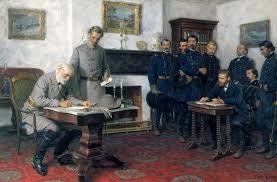
17
New cards
10% Reconstruction Plan
1863. Introduced by President Lincoln, it proposed that a state be readmitted to the Union once 10 percent of its voters had pledged loyalty to the United States and promised to honor emancipation of slaves.
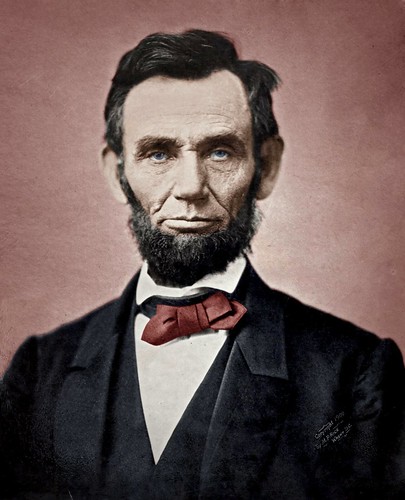
18
New cards
13th, 14th, 15th Amendments (Reconstruction Amendments)
13th: Abolished slavery except for criminal punishment.
14th: Gave equal rights and government protection to all men.
15th: Secured suffrage for men.
14th: Gave equal rights and government protection to all men.
15th: Secured suffrage for men.
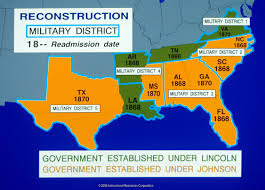
19
New cards
Radical Republicans
Most liberal part of the Republican Party. Desired political, economic, and social equality for African Americans. Wanted harsh punishment for the South after the Civil War.
20
New cards
Election of Lincoln
Angered many people in the south who owned slaves because he wanted to end slavery. Won the election of 1860 but did not win the popular vote. South Carolina was happy at the outcome of the election because now it had a reason to secede.11 states in the south seceded and made themselves the Confederacy after the election.
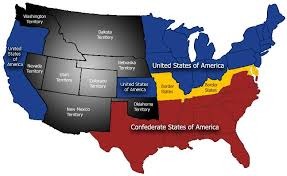
21
New cards
Abolitionist Movement
The movement to end the practice of slavery within the entirety of the United States.
22
New cards
Anaconda Plan
Union war plan by Winfield Scott, called for blockade of southern coast, capture of Richmond, capture of the Mississippi River, and to take an army through heart of south.
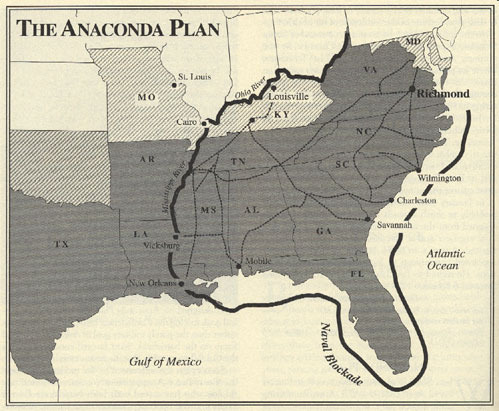
23
New cards
The American Party (The Know-Nothing Party)
(1840s-1850s) This political party carried anti-immigrant sentiments against the Catholic and the Irish and saw some electoral success.
24
New cards
Wilmot Proviso
(1846) Proposal to prohibit slavery in any land acquired in the Mexican War. Never passed by both houses of Congress but helped fan the flame of sectional tension.
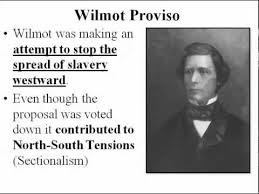
25
New cards
Free-Soil Party
(1848) Political party dedicated to stopping the expansion of slavery into new territories.
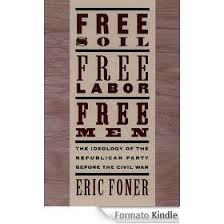
26
New cards
Treaty of Guadalupe Hidalgo
(1848) The Mexican government gave up the area of Texas and offered to sell the provinces of California and New Mexico as a result of its defeat in the Mexican-American War.
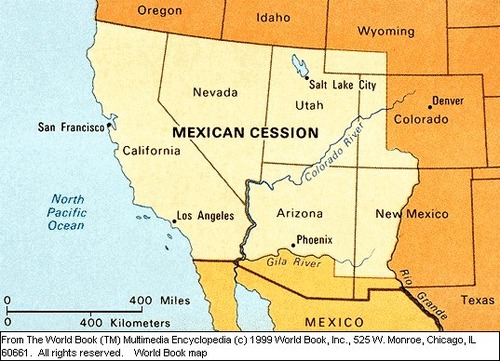
27
New cards
Gadsden Purchase
(1853) Agreement w/ Mexico that gave the US parts of present-day New Mexico & Arizona in exchange for $10 million; all but completed the continental expansion envisioned by those who believed in Manifest Destiny.
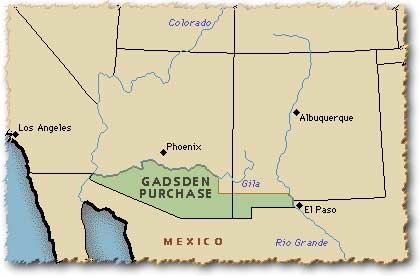
28
New cards
Ostend Manifesto
(1854) A declaration issued from Ostend, Belgium, by the U.S. ministers to England, France, and Spain, stating that the U.S. would be justified in seizing Cuba if Spain did not sell it to the U.S.
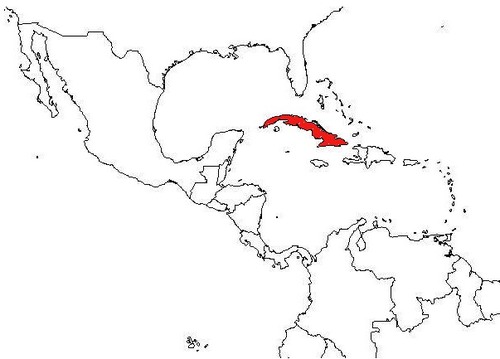
29
New cards
Bleeding Kansas
(1856-1861) A sequence of violent events involving abolitionists and pro-Slavery elements that took place in Kansas-Nebraska Territory. The dispute further strained the relations of the North and South, making civil war imminent.
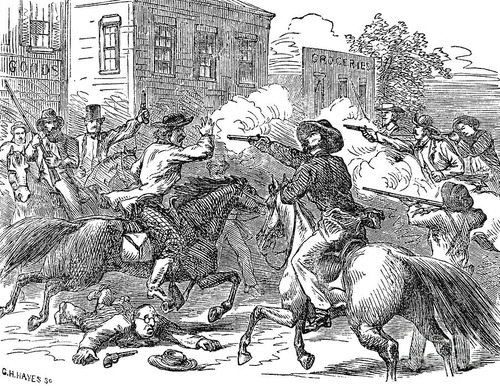
30
New cards
Dred Scott v. Sanford
(1857) Supreme Court case that decided US Congress did not have the power to prohibit slavery in federal territories and slaves, as private property, could not be taken away without due process. Invalidated the Missouri Compromise.
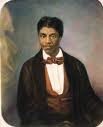
31
New cards
John Brown's Raid on Harper's Ferry
(1859) John Brown led a raid on Harper's Ferry. He hoped to start a rebellion against slaveholders by arming enslaved African Americans. Brown was quickly defeated by citizens and federal troops. Brown became a villain to southerners who now thought northerners would use violence to end slavery as well as a martyr to some northerners who saw Brown as someone who sacrificed himself for the ideal of freedom for all.
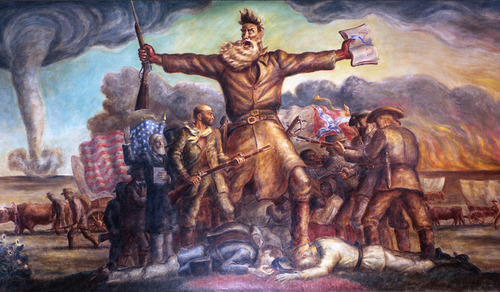
32
New cards
Election of 1860
(1860) The United States presidential election of 1860 set the stage for the American Civil War. Hardly more than a month following Lincoln's victory came declarations of secession by South Carolina and other states, which were rejected as illegal by outgoing President James Buchanan and President-elect Lincoln.
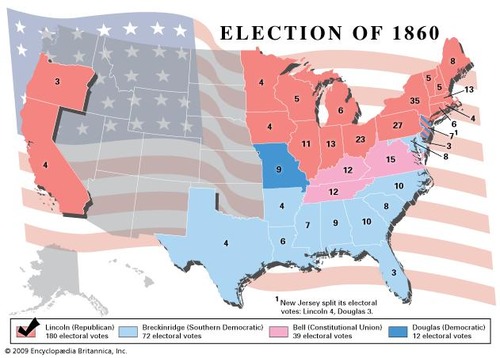
33
New cards
Civil Rights Act of 1867
(1867) Banned discrimination in public accommodations, prohibited discrimination in any federally assisted program, outlawed discrimination in most employment; enlarged federal powers to protect voting rights and to speed school desegregation.
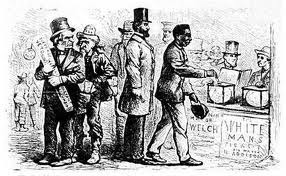
34
New cards
Thirteenth Amendment
(1865) The constitutional amendment ratified after the Civil War that forbade slavery and involuntary servitude.
35
New cards
Fourteenth Amendment
(1868) Provided equal protection of the law to freed slaves. Representation for any state that withheld voting from African Americans would be reduced.

36
New cards
Fifteenth Amendment
(1870) Prohibited any state from denying citizens the right to vote on the grounds of race, color, or previous condition of servitude.
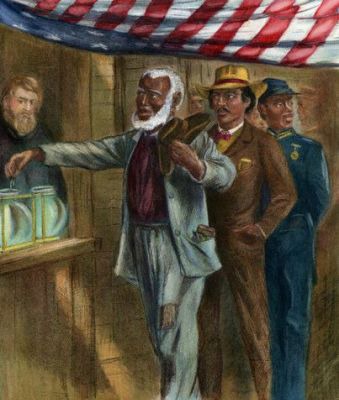
37
New cards
Compromise of 1877
(1877) It withdrew federal soldiers from their remaining position in the South, enacted federal legislation that would spur industrialization in the South, appointed Democrats to patronage positions in the south, appointed a Democrat to the president's cabinet, and allowed Rutherford B. Hayes to win the election. Marked the end of reconstruction.
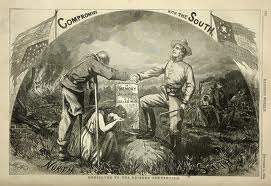
38
New cards
Manifest Destiny
A notion held by a nineteenth-century Americans that the United States was destined to rule the continent, from the Atlantic the Pacific.
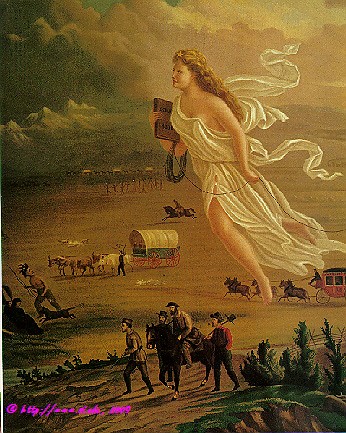
39
New cards
Texas Annexation
1845. Originally refused in 1837, as the U.S. Government believed that the annexation would lead to war with Mexico. Texas remained a sovereign nation. Annexed via a joint resolution through Congress, supported by President-elect Polk, and approved in 1845. Land from the Republic of Texas later became parts of NM, CO, OK, KS, and WY.
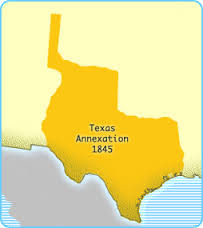
40
New cards
"Fifty-Four Forty or Fight"
The phrase used in James K Polk's 1844 presidential election dealing with the Oregon Territory. Polk's campaign used the phrase as a rallying cry for the United States to obtain all of Oregon Territory, including land claimed by the English, up through Northern Canada.
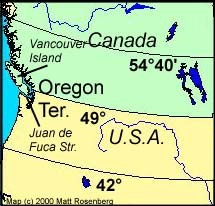
41
New cards
Oregon Trail
2000 mile long path along which thousands of Americans journeyed to the Willamette Valley in the 1840's.
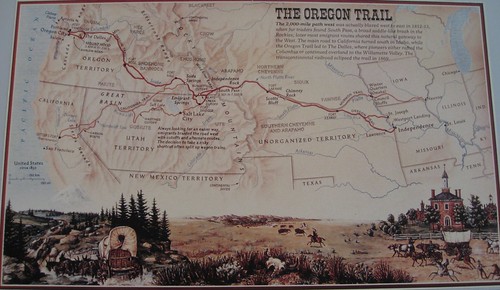
42
New cards
California Gold Rush
1849. Gold discovered in California attracted a rush of people all over the country and world to San Francisco; arrival of the Chinese; increased pressure on federal government to establish a stable government

43
New cards
Mexican American War
1846 - 1848. President Polk declared war on Mexico over the dispute of land in Texas. At the end, American ended up with 55% of Mexico's land, called the Mexican Cession.
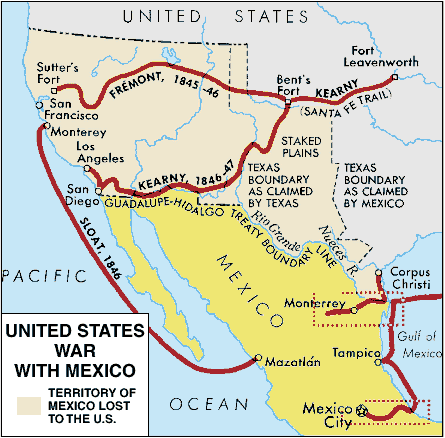
44
New cards
Republican Party
1854. Established by anti-slavery Whigs and Democrats, "free-soilers" and reformers from the Northwest met and formed party in order to keep slavery out of the territories.
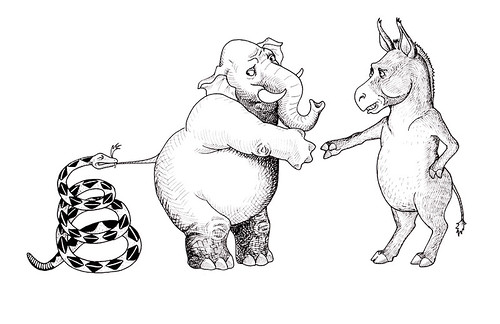
45
New cards
Stephen A. Douglas
Senator from Illinois who ran for president against Abraham Lincoln and was a leading voice in the debates over slavery and its expansion before the Civil War. Wrote the Kansas-Nebraska Act and the Freeport Doctrine.
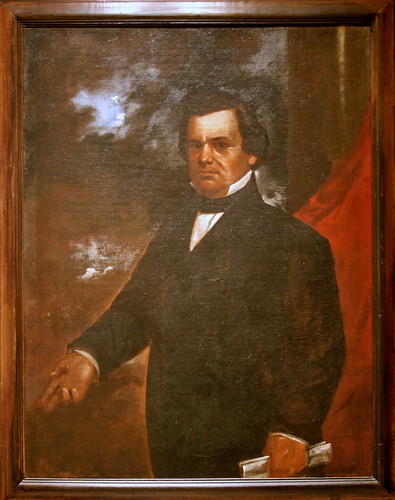
46
New cards
Freeport Doctrine
Stated that exclusion of slavery in a territory (where it was legal) could be accomplished by the refusal of the voters to enact any laws that would protect slave property. Stated by Stephen Douglass during the Lincoln-Douglass debates, eventually contributed to his loss in the 1860 presidential election as Democrats believed he had walked back the gains made with the Dred Scott v. Sanford decision.
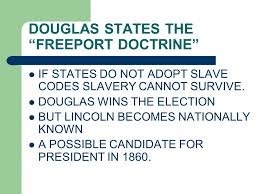
47
New cards
Abraham Lincoln
16th President of the United States saved the Union during the Civil War and emancipated the slaves; was assassinated by Booth (1809-1865)
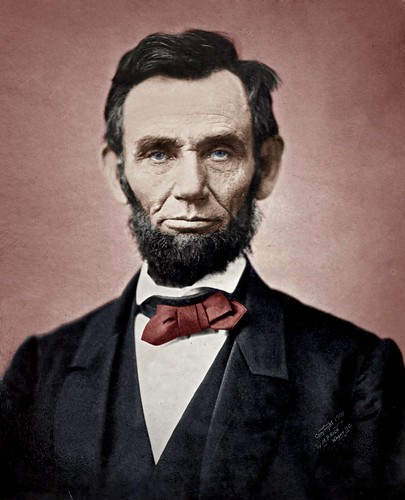
48
New cards
secession
Formal withdrawal of states or regions from a nation
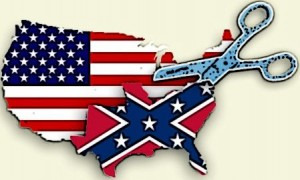
49
New cards
habeas corpus
Petition requiring law enforcement officers to present detained individuals before the court to examine the legality of the arrest. Protects individuals from arbitrary state action. Suspended by Lincoln during the Civil War.

50
New cards
sectionalism
Term used to describe the growing differences between the regions of the United States, especially the North and South, leading up to the Civil War.
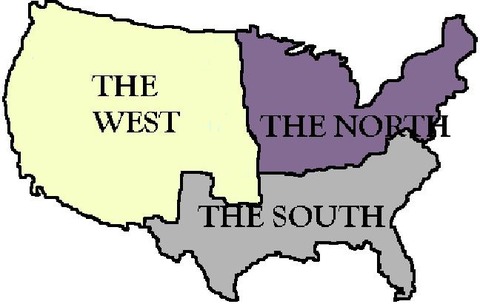
51
New cards
Robert E. Lee
Confederate general who had opposed secession but did not believe the Union should be held together by force. Military genius whose aggressiveness made him a fearsome opponent throughout the Civil War.
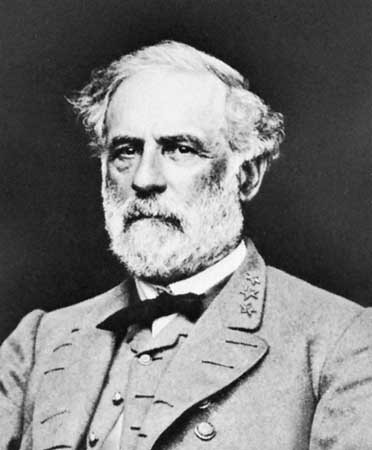
52
New cards
Fort Sumter
Federal fort in the harbor of Charleston, South Carolina; the confederate attack on the fort marked the start of the Civil War.
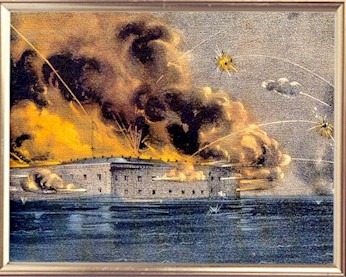
53
New cards
Battle of Antietam
A battle near a sluggish little creek, it proved to be the bloodiest single day battle in American History with over 26,000 lives lost in that single day. Prevented an Confederate invasion of Maryland.
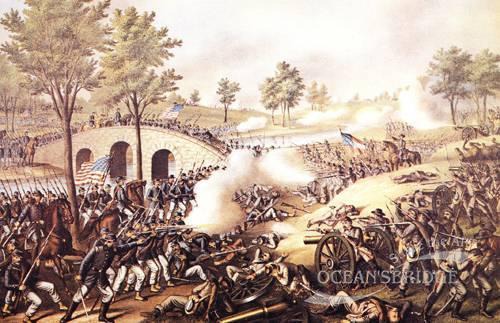
54
New cards
Battle of Gettysburg
A large battle in the American Civil War, took place in southern Pennsylvania from July 1 to July 3, 1863. Union General George G. Meade led an army of about 90,000 men to victory against General Robert E. Lee's Confederate army of about 75,000. Proved to be a significant turning point in the war because of the loss of about 1/3 of Lee's army.
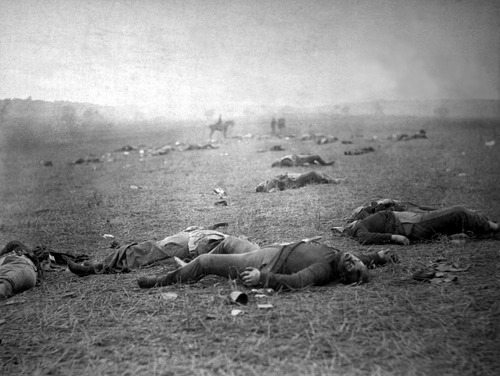
55
New cards
Ulysses S. Grant
An American general and the eighteenth President of the United States (1869-1877). He achieved international fame as the leading Union general in the American Civil War.
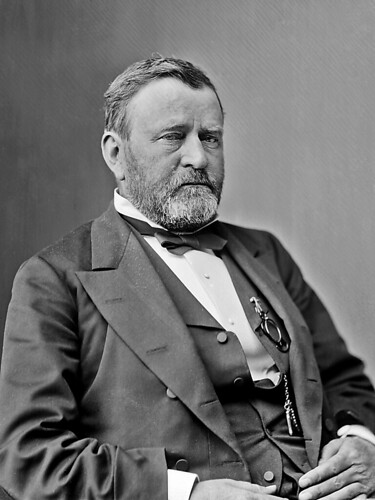
56
New cards
William Tecumseh Sherman
Union General who destroyed South during "march to the sea" from Atlanta to Savannah; example of total war and "scorched-earth" military tactics.
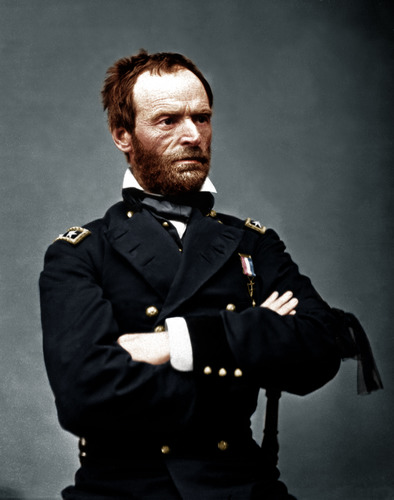
57
New cards
Thomas "Stonewall" Jackson
He was a confederate general who was known for his fearlessness in leading rapid marches, bold flanking movements, and furious assaults. He earned his nickname at the battle of first bull run for standing courageously against union fire. During the battle of Chancellorsville his own men accidently mortally wounded him.
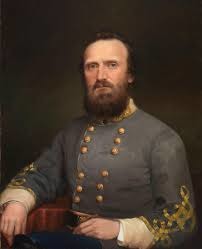
58
New cards
martial law
Rule by the army instead of the elected government (such as in the South as a result of the Military Reconstruction Act)

59
New cards
Radical Reconstruction
Name given to the period when Congress, which was controlled by Republicans, took over Reconstruction efforts. When southerners balked at some of the more moderate reforms proposed, more radical republicans started to gain more power and pass more legislation.
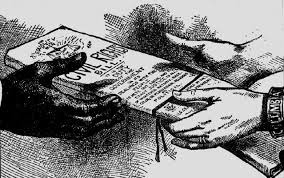
60
New cards
Military Reconstruction Act
1867. Divided the South into five districts and placed them under military rule; required Southern States to ratify the 14th amendment; guaranteed freedmen the right to vote in convention to write new state constitutions
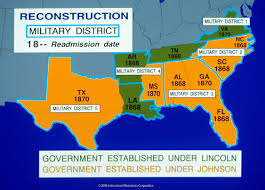
61
New cards
Freedmen's Bureau
1865. Organization (turned government agency) run by the army to care for and protect southern Blacks after the Civil War, sometimes including settling them on confiscated confederate lands.
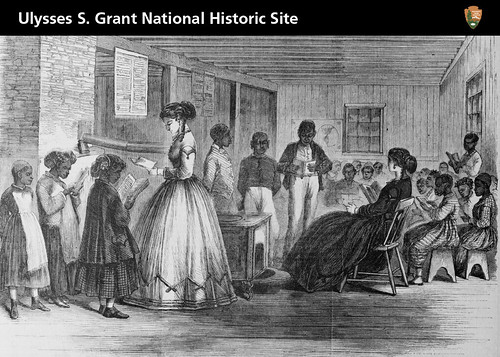
62
New cards
Election of 1876
Ended reconstruction because neither candidate had an electoral majority. The Democrat Sam Tilden loses the election to Rutherford B Hayes, Republican, was elected, and then ended reconstruction as he secretly promised.
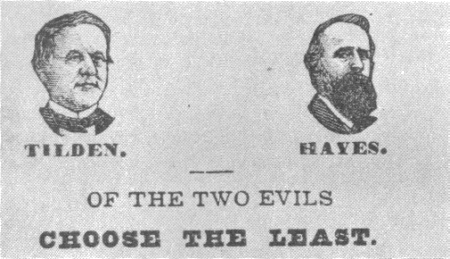
63
New cards
carpetbagger
A northerner who went to the South immediately after the Civil War; especially one who tried to gain political advantage or other advantages from the disorganized situation in southern states (as viewed from the southern perspective).
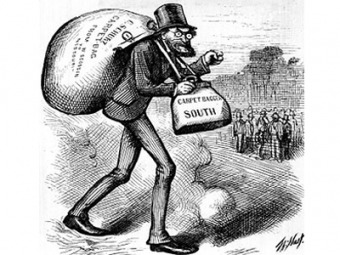
64
New cards
scalawag
A derogatory term for southerners who were working with the North to buy up land from desperate southerners; sometimes used in a general way by southerners criticizing other southerners who had northern sympathies.
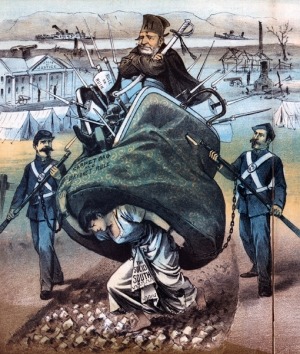
65
New cards
Gag Resolution
Strict rule passed by pro-southern Congressmen in 1836 to prohibit all discussion of slavery in the House of Representatives
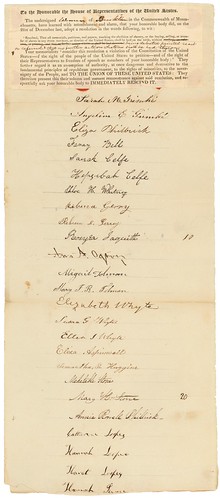
66
New cards
James K. Polk
Democratic president after John Tyler who was best known for policies that promoted Manifest Destiny and expansionism.
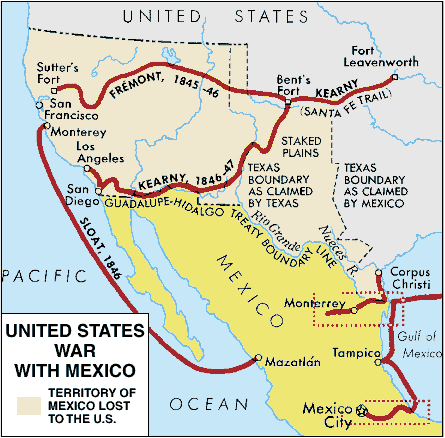
67
New cards
John C. Fremont
An American military officer, explorer, the first candidate of the Republican Party for the office of President of the United States (1856), and the first presidential candidate of a major party to run on a platform in opposition to slavery.
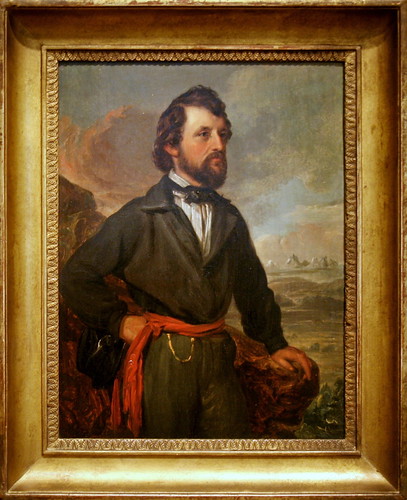
68
New cards
Bear Flag Revolt
(1846) a revolt that took place during the Mexican-American War when 500 Americans (Anglos) in Mexican California took the city of Sonoma, CA in the spirit of Manifest Destiny and declared California to be an independent nation.
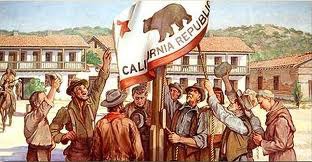
69
New cards
Liberty Party
A former political party in the United States; formed in 1839 to oppose the practice of slavery; merged with the Free Soil Party in 1848.
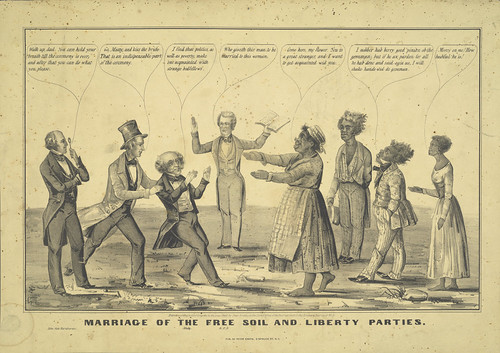
70
New cards
John C. Calhoun
Senator who argued for states' rights for the South. He asked for slavery to be left alone, slaves to be returned to the South, and state balance to be kept intact.
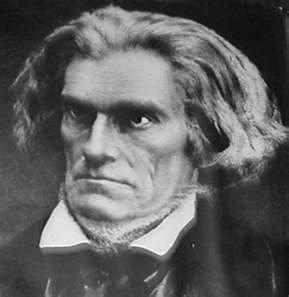
71
New cards
William H. Seward
Congressman of the "Young Guard" who fiercely opposed slavery and argued that Americans should follow a "higher law" (God's law) over the Constitution when it came to the issue of slavery.
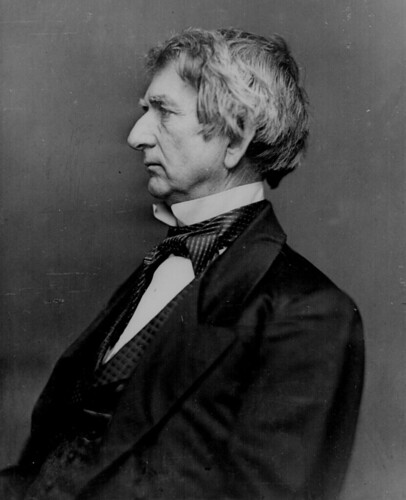
72
New cards
Henry Clay
Known as the "Great Compromiser"; senator who pushed for compromise between the North and South and worked with Stephen Douglas; major figure in the passing of both the Missouri Compromise (1820) and Compromise of 1850.
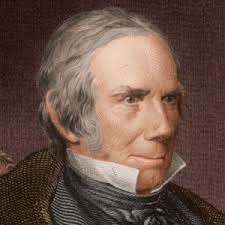
73
New cards
Underground Railroad
Secret system of safe houses along a route that led many slaves to freedom in the North and eventually Canada.
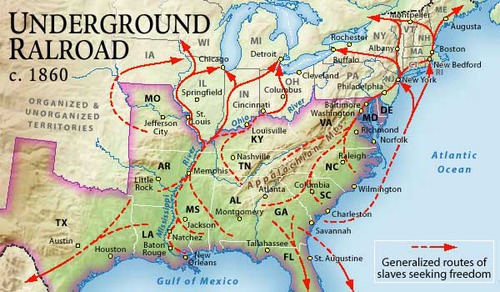
74
New cards
"Fire Eaters"
Refers to a group of extremist pro-slavery politicians from the South who urged the cessation of southern states.
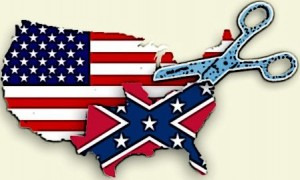
75
New cards
Charles Sumner
Senator who spoke out for black freedom and racial equality post-Civil War. Publicly beaten by Preston Brooks for speaking out against the violence in Kansas, an event that marked increasing tensions between the North and South prior to the Civil War.
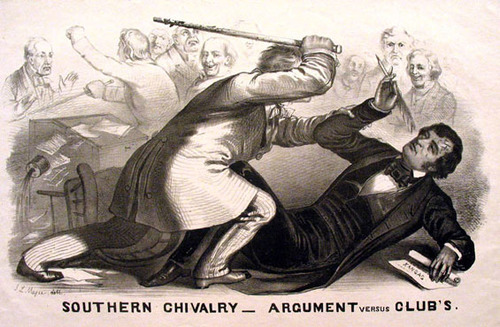
76
New cards
Jefferson Davis
President of the Confederate States of America prior to and during the Civil War.
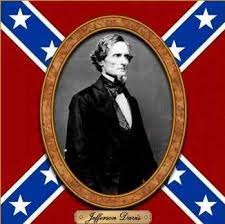
77
New cards
self-determination
The ability of a people/government to determine their own course or future using their own free will.

78
New cards
Lecompton Constitution
Supported the existence of slavery in the proposed state and protected rights of slaveholders. It was rejected by Kansas, making Kansas an eventual free state (and was a factor in spurring violence there).
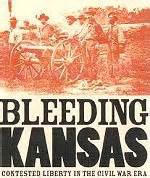
79
New cards
Lincoln-Douglas Debates
Lincoln challenged Stephen Douglas to debates during the senatorial race of 1858 which became a public referendum on the issue of slavery.
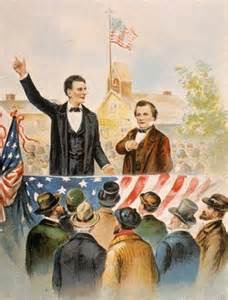
80
New cards
Border States
Southern states that never chose secession and joined the Confederacy during the Civil War (Missouri, Kentucky, Maryland, and Deleware).
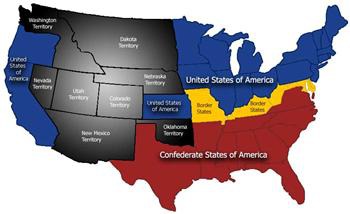
81
New cards
Andrew Johnson
17th President of the United States, A Southerner form Tennessee, as V.P. when Lincoln was killed, he became president. He opposed radical Republicans who passed Reconstruction Acts over his veto. The first U.S. president to be impeached, he survived the Senate removal by only one vote.
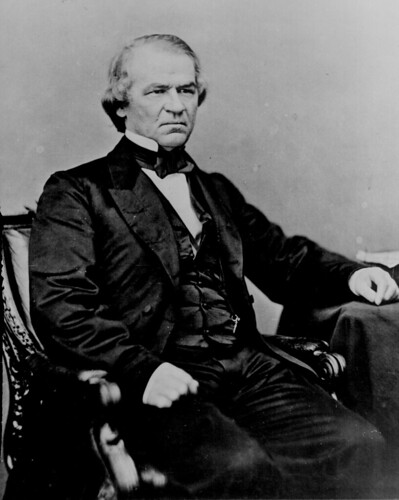
82
New cards
George B. McClellan
First commander of the Army of the Potomac; well-known for being a master at training an army; was replaced several times by President Lincoln during the Civil War because of his timidness and sometimes outright refusal to send his army into battle.
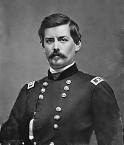
83
New cards
Copperheads
Nickname for Northerners who were pro-Confederacy.
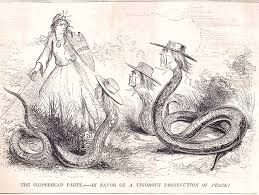
84
New cards
First Battle of Bull Run (Battle of Manassas)
(July 1861) first major conflict of the Civil War. Southern victory led to overconfidence.
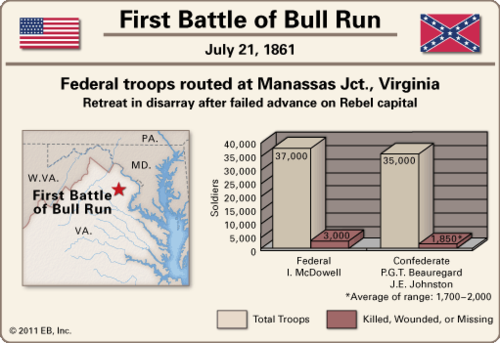
85
New cards
Thaddeus Stevens
Radical Republican congressman from Pennsylvania who defended runaway slaves in court for free and insisted on being buried in a black cemetery; hated white Southerners. Leading figure on the Joint Committee on Reconstruction and for the social equality of African Americans.
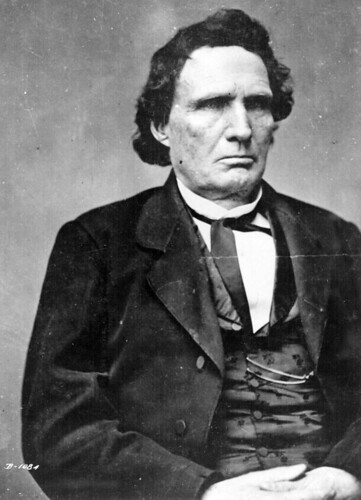
86
New cards
Wade-Davis Bill
Bill pushed by Congress in 1864 that required 50 percent of a state's voters take the oath of allegiance and demanded stronger safe-guards for emancipation than proposed in Lincoln's 10 percent plan. Pocket-vetoed by Lincoln.
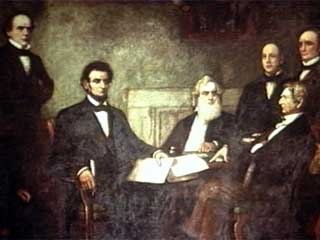
87
New cards
Civil Rights Act (1866)
A Reconstruction bill which gave which granted citizenship to African Americans and weakened the poliferation of Black Codes in the South.
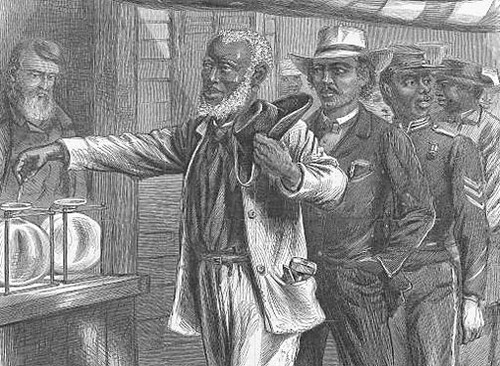
88
New cards
Redeemers
Largely former slave owners who were the bitterest opponents of the Republican program in the South. Staged a major counterrevolution to "redeem" the south by taking back southern state governments. Their foundation rested on the idea of racism and white supremacy.
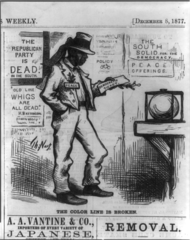
89
New cards
Ku Klux Klan
The "Invisible Empire of the South", founded in Tennessee in 1866, made up of embittered white Southerners who resented the success and ability of Black legislators. They would terrorize, mutilate, and even murder "upstart" blacks or their supporters to "keep them in their place".
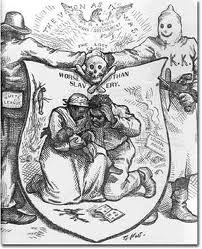
90
New cards
"Seward's Folly"
Refers to the United States' Secretary of State William Seward's decision to purchase the Alaskan territory from Russia in 1867. At the time, Seward's decision to buy the land was regarded as a terrible one by many critics in the United States.
